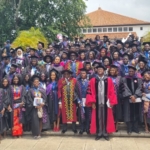
When a government steps forward and says, “We see you, we hear you, and we’re doing something about it,” that’s progress. That’s the kind of leadership people want to believe in—leadership that listens, leadership that acts.
And so, when Ghana’s Foreign Minister announced the Student Desk Initiative, a program designed to support Ghanaian students abroad, there was a reason to take notice.
The idea itself is commendable. Ghanaian students, studying in foreign lands, often feel stranded, dealing with bureaucracies they don’t understand, facing financial burdens they can’t escape, struggling with the weight of loneliness and uncertainty. A policy that puts them at the center, that promises assistance with fees, immigration hurdles, accommodation issues, medical emergencies, and legal aid, sounds like exactly the kind of solution they’ve been waiting for.
But here’s the thing: good intentions are not enough. A program can sound good. It can make for a great announcement. But the real question is—does it work? Does it actually solve the problems it’s meant to fix?
That’s the test of leadership. That’s the measure of progress. And when we look closely at this initiative, when we peel back the layers of the announcement and ask the hard questions—we start to see the cracks.
The Promise of No Cost, But at What Price?
One of the most striking claims in this policy is that it will be implemented “at no extra cost to the taxpayer.” Now, on the surface, that sounds fantastic. We live in a world where government budgets are stretched thin, where every dollar spent needs to be justified. And the idea that we can offer students comprehensive support without spending more money? That’s the kind of efficiency people like to hear.
But let’s pause for a second. Let’s think this through.
- If a Ghanaian student abroad needs emergency medical assistance, who pays for it? Many students don’t have health insurance. If they get sick, if they get into an accident, is the embassy covering their medical bills?
- If a student is facing a serious legal issue, how does the embassy provide legal aid? What kind of cases does this cover? Visa problems? Wrongful arrests? What about civil cases, does a student going through a divorce qualify for this legal aid? Most countries have local legal aid services, is Ghana stepping in because students don’t qualify for these?
- If a student has nowhere to stay, how does the embassy “assist” them? Are they negotiating cheaper rent? Are they offering short-term housing? And if so, who’s paying for that?
Even if the answer to these questions isn’t full financial support, even if the solution is just helping with paperwork, referrals, negotiations—that still costs money. Legal advice isn’t free. Processing documents isn’t free. Time spent handling these cases isn’t free.
And here’s another question: If existing consular staff are taking on these responsibilities, what were they doing before? Were they underutilized? If not, does this mean other consular services—like visa processing, trade facilitation, and diplomatic work—will slow down?
Government is about choices. And if we say this policy will come at no cost, we need to ask—who’s actually paying for it?
The insistence that this initiative will come at no cost to the taxpayer raises critical questions about its effectiveness. While training existing embassy staff to take on additional responsibilities might seem cost-effective, it risks overburdening personnel who are already stretched thin. Certain issues—such as mental health support—require specialized attention, which embassy staff may not be equipped to handle. A more sustainable approach would be to recruit students with relevant expertise in areas like counselling, legal aid, and career guidance to work part-time on this desk. This would not only ensure that students receive professional support but also provide employment opportunities without the expense of full-time hires. While financial prudence is important, being overly fixated on avoiding costs to the taxpayer could undermine the very purpose of the initiative by failing to address the real challenges Ghanaian students face abroad.
The Real Challenge: Money Talks
Here’s the truth: The biggest problem facing Ghanaian students abroad isn’t paperwork. It isn’t immigration forms. It isn’t even legal hurdles. It’s money.
If you sit down with a group of Ghanaian students abroad, the first thing they’ll tell you isn’t that they need “fee facilitation.” They’ll tell you that they need the money to pay the fees in the first place.
Delayed scholarship payments have left students unable to pay tuition, leading to evictions, academic withdrawals, and even deportations.
Students not on scholarships are struggling to make ends meet. Some can’t find jobs because of language barriers, or because their experience isn’t recognized in foreign job markets.
Others are simply struggling for food, for upkeep, for the basic dignity of being able to focus on their studies without worrying about where their next meal is coming from.
So the question we should be asking is: What exactly does “fee facilitation” mean? If there’s no financial backing, how does an embassy help a student who just doesn’t have the money? Are we offering tuition loans? Are we negotiating extended deadlines with universities? Or are we just offering sympathy and a recommendation letter?
If we’re serious about supporting students, we need more than desks. We need a real financial safety net.
Mental Health: The Invisible Struggle
We often talk about academic struggles. We talk about financial struggles. But there’s one challenge we rarely discuss, the mental and emotional toll of studying abroad.
Living in a foreign country, away from home, away from family, is not easy. The weight of expectations is heavy. The fear of failure is real. Add financial stress, add academic pressure, add cultural isolation, and you have a silent crisis that too many students are suffering through alone.
So let’s ask—if a student is struggling with depression, with anxiety, with the crushing weight of loneliness—how does a Student Desk at an embassy help?
- Are consular officers trained in mental health first aid?
- Are there partnerships with psychologists and student counselors?
- Is there a real system in place to make sure students who need help actually get it?
Because if the answer to these questions is no, then what we’re offering students isn’t real support, it’s just another administrative checkpoint. And that’s not enough.
The Right Focus: What Ghana Should Do Instead
A policy is only as good as its impact. And if the goal is to truly support Ghanaian students abroad, we need to go beyond symbolic gestures. We need real, tangible solutions—solutions that address the root causes of their struggles, not just the symptoms.
1. Establish a Student Emergency Fund
If embassies are expected to support students in financial distress, they need resources to do so. This fund could be financed by:
- A dedicated portion of the national scholarship budget
- Public-private partnerships with Ghanaian businesses abroad
- Diaspora contributions—because many Ghanaians abroad want to help, they just need a structured way to do it
- Consular Internally Generated Funds (IGF)
2. Expand Support to Less-Populated and High-Risk Countries
Then, there’s the question of who really needs help the most. Right now, the policy is focused on countries with the largest student populations, the Londons and Beijings of the world. But that’s not where the real struggle is. A student in London can call an uncle in Croydon. A student in Eastern Europe or parts of Asia, where Ghanaian communities are smaller, can’t. They don’t have family nearby, they don’t have networks to lean on, and sometimes, they face discrimination. That’s where government support should be strongest. That’s where a Student Desk could make the biggest difference.
3. Train Consular Staff in Student Welfare & Mental Health First Aid
let’s be honest about what embassies can actually do. If consular staff are expected to step in when students need legal, financial, or medical help, they need more than administrative training. They need to understand how to support students in crisis, how to connect them to the right resources, how to actually make a difference in their lives. We need trained personnel who don’t just process paperwork, but know how to navigate real-life emergencies.
Embassy staff should be equipped to:
- Handle student crises effectively
- Offer basic mental health first aid
- Direct students to real, practical resources
4. Use Data to Make Policy Decisions
Finally, we need to use data, not guesswork, to shape policy. If we want to fix student challenges, we need to track real student concerns. We need to analyze why students are reaching out to embassies, what their most frequent problems are, and where the biggest gaps exist. And we need to publish yearly reports so that policy evolves with student realities, not based on assumptions from high-level meetings in Accra.
Good policy is based on facts, not assumptions. if we’re serious about solving problems, we need to know what they actually are.
Final Thoughts: A Step in the Right Direction—But Let’s Get It Right
A Student Desk is a start. But a real support system, one backed by funding, targeted to the most vulnerable, staffed by people who can actually help, and shaped by real data, is how we turn intentions into impact. That’s the difference between a headline and a lasting solution. And that’s what Ghanaian students deserve.
DISCLAIMER: The Views, Comments, Opinions, Contributions and Statements made by Readers and Contributors on this platform do not necessarily represent the views or policy of Multimedia Group Limited.
- President Commissions 36.5 Million Dollars Hospital In The Tain District
- You Will Not Go Free For Killing An Hard Working MP – Akufo-Addo To MP’s Killer
- I Will Lead You To Victory – Ato Forson Assures NDC Supporters
Visit Our Social Media for More




